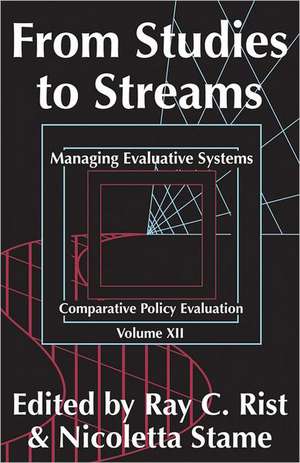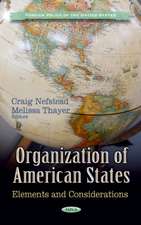From Studies to Streams: Managing Evaluative Systems: Comparative Policy Evaluation
Autor Nicoletta Stameen Limba Engleză Paperback – 15 apr 2011
The current era is characterized by the emergence of an increasingly global set of pressures for governments to perform effectively, not just efficiently, and to demonstrate that their performance is producing desired results. Information technology allows enormous quantities of information to be stored, sorted, analyzed, and made available at little or no cost. The result for those in the evaluation community is that, while individual evaluations are still conducted and reported upon, they are a rapidly diminishing source of information.
In the new environment, ever accelerating political and organizational demands and expectations are reframing thinking about the definition of what, fundamentally, constitutes evaluation and what we understand as its applications. In this twelfth volume in the Comparative Policy Evaluation series, authors from fourteen nations address these issues from multiple vantage points. From Studies to Streams is an essential tool for policymakers, government officials, and scholars interested in the contemporary status of evaluation.
| Toate formatele și edițiile | Preț | Express |
|---|---|---|
| Paperback (1) | 414.91 lei 6-8 săpt. | |
| Taylor & Francis – 15 apr 2011 | 414.91 lei 6-8 săpt. | |
| Hardback (1) | 1007.36 lei 6-8 săpt. | |
| Taylor & Francis – 15 iul 2005 | 1007.36 lei 6-8 săpt. |
Din seria Comparative Policy Evaluation
-
 Preț: 310.03 lei
Preț: 310.03 lei - 26%
 Preț: 766.24 lei
Preț: 766.24 lei -
 Preț: 416.22 lei
Preț: 416.22 lei - 30%
 Preț: 768.64 lei
Preț: 768.64 lei - 18%
 Preț: 1000.27 lei
Preț: 1000.27 lei - 16%
 Preț: 216.07 lei
Preț: 216.07 lei -
 Preț: 389.66 lei
Preț: 389.66 lei - 16%
 Preț: 216.08 lei
Preț: 216.08 lei - 14%
 Preț: 299.52 lei
Preț: 299.52 lei -
 Preț: 414.32 lei
Preț: 414.32 lei -
 Preț: 384.86 lei
Preț: 384.86 lei - 16%
 Preț: 299.52 lei
Preț: 299.52 lei -
 Preț: 440.00 lei
Preț: 440.00 lei -
 Preț: 442.76 lei
Preț: 442.76 lei -
 Preț: 384.86 lei
Preț: 384.86 lei - 31%
 Preț: 767.88 lei
Preț: 767.88 lei - 18%
 Preț: 1005.67 lei
Preț: 1005.67 lei - 17%
 Preț: 259.98 lei
Preț: 259.98 lei - 14%
 Preț: 299.52 lei
Preț: 299.52 lei - 14%
 Preț: 299.52 lei
Preț: 299.52 lei - 29%
 Preț: 654.00 lei
Preț: 654.00 lei -
 Preț: 388.30 lei
Preț: 388.30 lei - 12%
 Preț: 299.52 lei
Preț: 299.52 lei -
 Preț: 190.77 lei
Preț: 190.77 lei - 22%
 Preț: 324.16 lei
Preț: 324.16 lei -
 Preț: 422.96 lei
Preț: 422.96 lei - 16%
 Preț: 260.73 lei
Preț: 260.73 lei - 20%
 Preț: 184.81 lei
Preț: 184.81 lei - 29%
 Preț: 652.84 lei
Preț: 652.84 lei - 26%
 Preț: 766.24 lei
Preț: 766.24 lei - 14%
 Preț: 299.52 lei
Preț: 299.52 lei
Preț: 414.91 lei
Nou
Puncte Express: 622
Preț estimativ în valută:
79.40€ • 86.22$ • 66.70£
79.40€ • 86.22$ • 66.70£
Carte tipărită la comandă
Livrare economică 22 aprilie-06 mai
Preluare comenzi: 021 569.72.76
Specificații
ISBN-13: 9781412818377
ISBN-10: 1412818370
Pagini: 316
Dimensiuni: 152 x 229 x 17 mm
Greutate: 0.42 kg
Ediția:1
Editura: Taylor & Francis
Colecția Routledge
Seria Comparative Policy Evaluation
Locul publicării:Oxford, United Kingdom
ISBN-10: 1412818370
Pagini: 316
Dimensiuni: 152 x 229 x 17 mm
Greutate: 0.42 kg
Ediția:1
Editura: Taylor & Francis
Colecția Routledge
Seria Comparative Policy Evaluation
Locul publicării:Oxford, United Kingdom
Cuprins
1: Channelled Streams of Evaluative Knowledge; 1: The “E” in Monitoring and Evaluation— Using Evaluative Knowledge to Support a Results-Based Management System; 2: How Evaluation Can Help Make Knowledge Management Real; 2: Information Systems at Work for Evaluation; 3: Management of Evaluative Knowledge in National Health: Some Comparative Observations; 4: Organizing Knowledge; 5: Managing Evaluations in the Netherlands and Types of Knowledge; 6: Implementing Results-Based Management; 3: Thematic Evaluations and Their Uses; 7: Complex Policies and Evaluative Streams of Knowledge; 8: Evaluating Knowledge about the Instruments of Government: The Canadian Federal Experience; 9: Why Evaluations Sometimes Can’t be Used— and Why They Shouldn’t; 4: Strategic Budgeting and Streams of Knowledge; 10: Evaluation Use and Information Communication Technology; 11: Evaluative Information in the Norwegian Ministries; 12: Evaluation Knowledge for Strategic Budgeting; 5: Multi-Study Evaluation and the Learning Organization; 13: Evaluation, Knowledge Management, and Learning: Caught between Order and Disorder; 14: Patterns of Evaluative Knowledge Creation and Utilization within the World Bank; Postscript; Conclusion
Descriere
Recent developments in policy evaluation have focused on new notions of process and use or, notably, "influence














